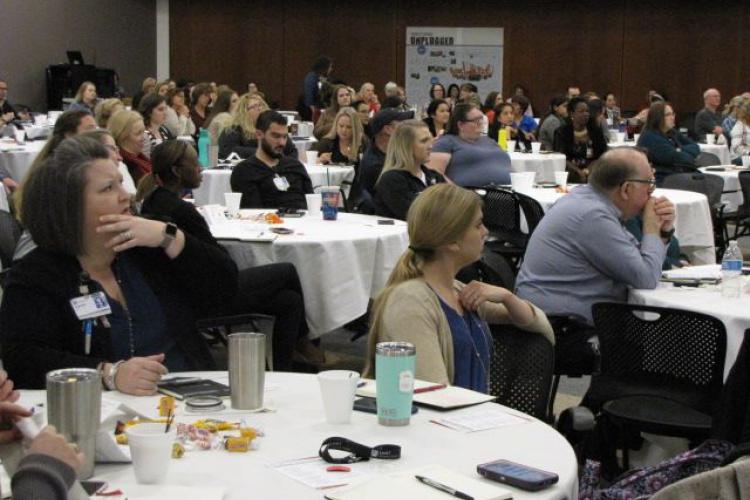
Healthcare providers from across the Metroplex attended the eighth annual JPS Health Network Trauma Symposium Friday at Tarrant County College’s Trinity River Campus.
They left with a treasure trove of information about emerging issues in the medical field and about how to take care of themselves so they can be on top of their game when they’re taking care of others.
“The challenge is ‘how do we, who live in the disaster world, retain our joy?’” Lee Ann Franklin, JPS Director of Spiritual Care and Ethics, said when describing the Trauma Symposium’s purpose. “We’re here to fill our tool boxes with the things we need to take care of ourselves and to take care of others to take care of the hurting world.”
JPS Violence and Injury Prevention Manager Mary Ann Contreras, organizer of the Trauma Symposium, said she is thrilled that the event has grown so much that it now attracts nationally renowned speakers from coast to coast to Fort Worth to share their expertise.
“We're very fortunate to have some of the foremost experts in the country come to the Trauma Symposium,” Contreras said. “It’s fascinating to hear what they have to say.”
Speakers included:
- Dr. Mauricio Lynn, of Miami, who spoke about the “Ten Commandments of Mass Casualty Incidents and Disaster”
- Dr. Edward E. Cornwell III, of Washington D.C., who discussed the topic of “Understanding Increased Mortality After a Gunshot Injury”
- RN Karen Doyle, of Baltimore, presented “Violence in the Workplace: Do You Have a Plan?”
- RN Bonnie McCracken, of Sacramento, Calif., discussed “Mobility Protocol for Critically Ill and Ventilated Patients.
- Dr. Brian Williams, of Parkland Hospital in Dallas, on “The Intersection of Racism and Violence in Medicine”
- JPS Emergency Medicine physician Dr. Amy Faith Ho who discussed the topic of Trauma Care and Second Victim Syndrome in Healthcare Providers.
Williams said he doesn’t consider himself to be an emotional person. But he learned abruptly how dealing with trauma and tragedy on a daily basis affected him. He couldn’t get past how being called to action in 2016 after several police officers were shot changed him. That night, police were being brought in by their colleagues in squad cars driven with their tires shot out because there was no time to wait for an ambulance to arrive.
“I did not cry at my wedding 13 years ago,” Williams shared. “I did not cry when my daughter was born seven years ago. But that night I was crying, on the floor, broken.”
Williams said he had trouble speaking about that day without being reduced to tears for two years. But he pushed through it, refusing to avoid the situation because he wanted to learn how to get past it and continue to take care of the people who need him.
“This is a talk about resilience,” Williams said. “The first victim is the patient. The second victim is the provider who has to deal with an untimely death. What we need to avoid is the third victim who is a patient who receives less than optical care because you are impaired” by burnout and post-traumatic stress.
Ho said it’s natural for doctors to blame themselves when things go wrong. But if they allow themselves to dwell on their second guessing, they learn to doubt their skills and not only grow mentally and emotionally tire out, they put themselves at a much higher risk to make mistakes in the future.
“Things are always to chaotic and so crazy that there is always room for questioning yourself about if you can do something better,” Ho said. “You start to question your judgement and your care, those are called ‘haunted re-enactments’ and you literally start to dream about them.”
Doctors have three choices to get past second victim syndrome: Thriving, surviving or dropping out and quitting the medical field or leaving the institution where they work.
“Thriving is what we want, but surviving is what most of us do,” Ho said. “What we should do to try to help our colleagues survive is create a just culture or a safety culture. That means there is no shame or blame, open and honest reporting of issues and a goal of having a quality learning and supportive environment is set.”
JPS President and CEO Robert Earley gave the opening address at the Trauma Symposium. He said he was glad caregivers had the opportunity not only to learn how to better take care of others – but to better take care of themselves.
“If we were to disappear tomorrow, Tarrant County would miss us,” Earley said, urging those in attendance to think of their well-being as it relates to work. “We’re not like a store that closes and you can go get a blouse or I can get a pair of shoes someplace else. You can’t get what we have to offer anyplace else.
“Trauma Symposium is a place to learn a few things,” Earley continued. “But this is also a time to reflect on how powerful, important and needed you are. When you’re a patient at JPS, as I have been, you understand that.”
